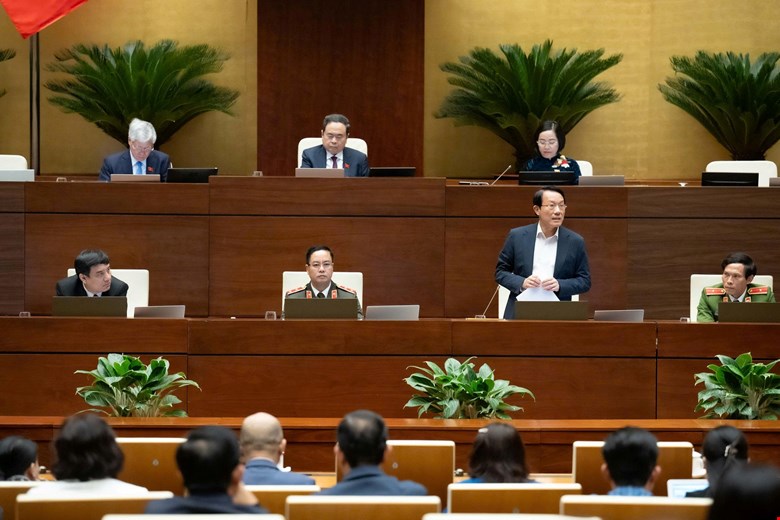On the afternoon of November 25, the National Assembly discussed in the hall the draft Law on Drug Prevention and Control (amended).
General Luong Tam Quang - Politburo member, Minister of Public Security - explained and clarified a number of issues raised by National Assembly deputies.
Regarding drug addiction treatment management and post-drug addiction treatment, the security agency has had concerns and researched and manufactured an electronic monitoring device. This device has both a monitoring and health monitoring function.
If approved by the National Assembly, this form will be applied in the coming time to some subjects. The goal is to do a good job of drug rehabilitation and post-drug management, towards a safe society.
Some National Assembly deputies have proposed adding regulations on the application of electronic monitoring measures in the management of illegal drug users, community drug addicts, drug addicts with replacement drugs and people under post-drug management.
The drafting agency has studied and proposed that if the draft law has provisions on subjects and authority of application, the Government will specify in detail on this content.

Regarding the management of people who have determined their addiction status and are waiting to prepare documents to be sent to compulsory drug rehabilitation facilities, the National Assembly member proposed to add management at compulsory drug rehabilitation facilities.
The drafting agency will coordinate research to revise the draft law in the direction of supplementing regulations on the management of people who identify drug addiction but do not have a stable place of residence.
This management proposes to apply compulsory drug rehabilitation measures at public drug rehabilitation facilities. This person can be managed at a reformatory school while waiting for the decision to send him for compulsory drug rehabilitation.
The authority to decide on the management period will be assigned to the commune-level police chief and this period will be deducted from the compulsory drug rehabilitation period.
Regarding the drug rehabilitation period, the drafting agency recommends keeping it the same as in the draft: the rehabilitation period is 24 months for the first time and 36 months for drug rehabilitation people from the second time or more.
The reason given is to help drug addicts fully apply all stages of the drug addiction treatment process, in order to improve the effectiveness and overcome the situation of relapse.
In practice, the regulation of the minimum/maximum level leads to inconsistent and dependent application due to lack of clear determination. On the other hand, health agencies can only determine whether they are addicted or not, and cannot determine the level of addiction, so it is difficult to have a basis to determine the specific time of drug addiction withdrawal.
Currently, addicts are gradually switching to using synthetic drugs, causing very diverse and unusual signs of addiction. Many subjects use mixed drugs, leading to alcoholism and psychosis, and can commit particularly serious crimes.
In response to the opinions of National Assembly deputies, the drafting agency will revise the draft in the direction of requiring people aged 12 to under 18 to have compulsory drug addiction treatment at reform schools or public drug rehabilitation facilities if they meet the conditions.
Specific conditions will be studied and assigned to the Government or the Minister of Public Security to guide regulations.











